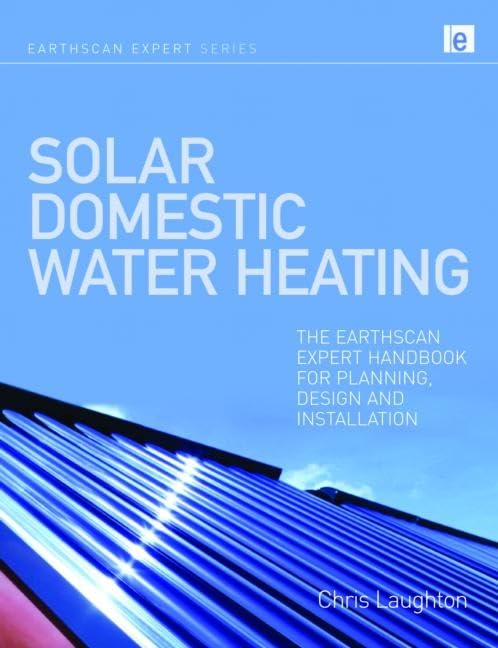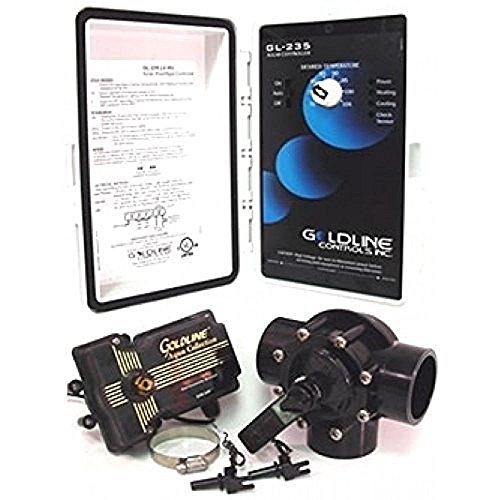
Swimming Pool Heating
Heating Your Pool with Swimming Pool Heating System
![]() Heating your outdoor swimming pool with a Swimming Pool Heating System powered by the sun is a simple and effective way to both lower your energy bills and keep your outdoor pool warm enough to swim throughout the year all at the same time.
Heating your outdoor swimming pool with a Swimming Pool Heating System powered by the sun is a simple and effective way to both lower your energy bills and keep your outdoor pool warm enough to swim throughout the year all at the same time.
Solar swimming pool heating systems are easy to install and will last for years providing you with plenty of free solar hot water. Just like the home solar heating systems, they can turn the immense heat energy from the sun into something useful.
A solar pool heating system is a very simple heating system to install and operate, all you need is a solar panel, a few pipes and maybe a pump. A typical solar pool heating system can provide sufficient hot water for an outdoor garden pool or even a jacuzzi of any shape or size as long as you have enough flat plate collectors in your system.

A flat panel solar pool heater really comes into its own in the spring and autumn months when the mornings and evenings are too cool for normal pool usage. By installing a solar swimming pool heating system, the recreational use of a normal garden swimming pool can be increased by up to four or five months a year just by using the heat energy from the sun.
Clearly, the size and type of solar pool heating system will vary for each pool design, location and available sunlight but the basic principal remains the same.
Before, to heat the water in an outdoor pool or spa you needed to use either an electrical heater, a gas heater, normally a propane heater or conserve the heat already in the pool by using a swimming pool cover. Today, things have changed and we can easily use the energy of the sun to heat the water using a simple solar pool heating system.
Comfortable swimming pool water temperature is relatively low compared to other uses of hot water such as baths and showers. Flat panel solar collectors are most efficient at low temperatures and are therefore well suited for pool heating were a large volume of water has to be heated to just a few degrees above the ambient temperature rather than to heat a smaller quantity to a much higher temperature.
Flat plate solar collectors can heat water efficiently up to about 60oC (140oF), so there is plenty of margin and no need to use the more expensive evacuated tube or concentrating solar collectors. A correctly sized solar pool heating system can gently raise the pool temperature by at least 5 to 10 degC (10 – 20 degF) above the normal water temperature during the day maintaining a comfortable swimming temperature each time the water passes through the solar collector. Remember that we only want to warm the water and not boil it.
So How Does Pool Heating Work
A solar pool heating system does not have to be complicated. A typical system consists of a flat panel solar collector, a filter, a pump and some tubing. The swimming pool water is circulated through a flat panel solar collector, usually mounted on a garage or outbuilding roof or next to the pool itself. The solar panel or panels can be glazed or unglazed the choice is yours however, there is a big difference in cost.
The water is heated by the suns solar energy which is absorbed by the water flowing over or through the panel before the heated water is returned back to the pool. An optional filter can be used to remove the dirt, leaves and debris before the water is pumped through the solar collector and back to the pool using suitable plastic or copper tubing.
Swimming pool heating systems do not require a separate water storage tank, since the pool itself serves as the storage tank and in most cases, the pools filtration pump can be used to circulate the swimming pool water through the filter and solar collector making it an active system with force circulation of the heated water.
In hotter climates or the middle of summer, the solar collector can also be utilized to cool the pool, by circulating the water around the system at night with the solar panel acting as a radiator instead off a solar collector. If you want to heat your pool during the colder winter months and weathers, a more advanced closed loop system may be required which includes anti-freeze and frost protection.
There are many different solar pool collectors available in the marketplace, each with their individual advantages and disadvantages. The size of the solar collector required for your solar pool heating system can be determined by many factors. These include:
- Geographic Location
- Size and Shape of your Pool
- Desired Pool Water Temperature
- Length of Swimming Season
- Length of Time Required to Reheat the Pool Water
As well as other factors such as wind conditions and shading from trees, walls or fences, etc, but a general rule of thumb is that you will need a system that is equal to about 50 to 80% of the pool surface area. That is the surface area of the water and not the volume of water.
So for example, lets assume you have a large outdoor pool of 10m x 6m (32′ x 20′) or 640 square feet. 50% of the surface area would be 320 square feet so we need enough solar thermal panels to heat that quantity of water. Solar thermal panels for use in swimming pool heating systems are available in standard panel sizes of 4’x 8′, 4’x 10′, 4’x 12′, so selecting the smaller size of 4’x 8′ or 32 square feet, we would need 10 thermal panels or 7 larger 4’x 12′ thermal panels.
Solar thermal panels for use in swimming pool heating systems are available in standard panel sizes which can be mounted next to the pool or on an adjacent roof making the installation of pump, filter and tubing much easier. There are both glazed and unglazed solar collectors available.
Glazed solar collectors are typically made using large diameter copper tubing and aluminium plates, with iron-tempered glass covers. These glazed units are quite expensive and heavy, but in colder weather this type of system is more efficient in heating the pools water than an open type unglazed collector. Glazed solar collector systems can also be used as domestic hot water heaters.
Making use of the enormous amount of solar energy to heat a swimming pool is the most prevalent use for solar energy around the world today. Solar pool heating systems will help you save money, and decrease greenhouse gas emissions. Solar pool and domestic hot water heating is already a superior choice for solar application.
To learn more about solar powered “Swimming Pool Heating Systems”, how they work, or to obtain more facts about the various types of solar thermal pool heating systems available, or to just explore the advantages and disadvantages of a solar thermal energy system for heating water, then why don’t you Click Here to get your copy from Amazon of one of the top “Solar Thermal Guides” today and find lots more good quality information and articles about the many different types a solar swimming pool heating systems can be used to keep the kids happier for longer.











Dear Administrator,
We have installed a solar pool heater. whether we need a back up electric or gas heater in morning to preheat the pool up to required temperature and then start the heating through solar by switching off the backup source? or the solar pool heater is enough to heat the pool without any backup. as our solar pool heating is not increasing the temperature.
total area of Solar collcetor = 780 ft2
Total pool surface area = 1600 ft2
average depth of water = 5.5 feet
Do you seriously believe a small solar panel will heat your pool water.
1600 ft2 x 5.5 ft = 8800 cubic feet of water
8800 ft3 = 250,000 litres or 250 m3
Solar power required to heat 250 m3 of water by only 10 degrees in 1 hour
litres x 4 x temperature rise in degrees / 3412
(4 is a factor and 3412 is a constant for BTU per Hour)
= (250000*4*10)/3412 = 2900kW or 2.9MW of power!!
This is why your solar pool heating is not increasing the temperature.
My parents will be hosting a pool party this weekend and they wanted to make sure that the water will be warm. It was explained here that a solar pool heating does not require a separate water storage water tank.
Wow, it sure is interesting that the solar heating system in the pool can also be ued to cool it during the summer! My children enjoy swimming a lot, and they often have friends over for a dip in our pool. I will definitely look into this clever solar pool heating systems to keep everybody nice and comfortable whatever the season is.
It’s good to know that it’s simple to install a solar pool heating system. I would love to get this for my swimming pool. I’ll have to get a flat panel solar pool heater, since it’s good for allowing you to swim during the spring and autumn and not worry about the water being too cold, like you said.
Very informative post. I’m looking at options for my pool currently and solar is on the list. How do you think it compares with other systems, for example gas?
I’m not sure how the solar heating works but some reason I don’t think ours is working , I keep trying to telll my husband I think too much water is coming out too fast to heat the water and he keeps answering me in away I just don’t get it . Can our solar heater not be working because the pump is pushing the water threw it to fast to heat up the water ??? Or is there another reason it’s not working. Thanks.
It depends on what you mean by “its not working”. If the sun heats the water by just 1 degree then your solar system is working. The question is, I think, that the water is not hot enough for you. Solar thermal works on conduction, that is, something gets hot from the suns thermal radiation and transfers the heat to the water, in the same way as an electric element heats water (kettle or boiler).
For the water to heat up significantly the water has to be in contact with the heated parts for an amount of time transferring the heat, thus if your pump is too powerful say, or the flow of water is too great, then the water does not have time to absorb the heat in sufficient quantities. Gradually over time the water will slowly heat up, but external circulation losses may be enough to cool it back down again.
Thanks for the post. Just looking at getting a pool heater and after reading this solar looks to be a good option.
After getting our first pool, my fiance and I are thinking about getting a heater as well. We are looking into the several different types of heating options to find the one we like. Knowing that solar systems are usually less complicated makes us lean more towards getting this option.
Solar pool heating system is a modern day appliance, which is used to heat the water of the swimming pool. It helps the owner of the pool reduce its electricity bill. If you want to install it in your pool, you have to hire a professional. The temperature of the pool should be checked at right intervals in order to confirm you that the pool heating system is working well.
Great article and very well explained. I believe in professionals so this is a very useful article for everyone. Many thanks for your share.
Personally, I would really choose solar pool heating rather than doing it any other way because it is much cheaper and nowadays, ways are being thought of to make solar power more affordable for everybody to use.
hi,
I have been thinking about installing a solar thermal panel to heat my water but I have been trying to find out the formula to calculate how much kilo-joule is needed to heat up one liter of water to one degree Celsius?
The specific heat required to heat one gram of water by 1degC is 4187 kJ/g per degC. As 1 watt is equal to 1joule/second, the amount of energy required in watt-hours is therefore:
4187,000 joules ÷ 3600 seconds = 1163 watt-hours or 1.16 kW-hours